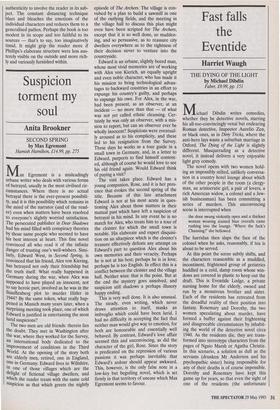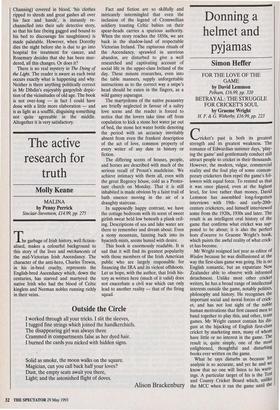Fast falls the Eventide
Harriet Waugh
THE DYING OF THE LIGHT by Michael Dibdin Faber, £9.99, pp. 151 Michael Dibdin writes comedies, whether they be detective novels, starring his all-too-convincingly venal but endearing Roman detective, Inspector Aurelio Zen, or black ones, as in Dirty Tricks, where the anti-hero lays waste a suburban marriage in Oxford. The Dying of the Light is slightly different. Masquerading as a detective novel, it instead delivers a very enjoyable light grey comedy.
The novel opens with two women hold- ing an impossibly stilted, unlikely conversa- tion in a country hotel lounge about which of the other people in the room (a clergy- man, an aristocratic girl, a pair of lovers, a rich American widow, a colonel and a Jew- ish businessman) has been committing a series of murders. This unconvincing scene is interrupted when the door swung violently open and a thickset woman wearing stained blue overalls came rushing into the lounge. 'Where the fuck's Channing?' she bellowed.
The harridan then slaps the face of the colonel when he asks, reasonably, if tea is about to be served.
At this point the scene subtly shifts, and the characters reassemble as a muddled, incontinent, frightened group of geriatrics huddled in a cold, damp room whose win- dows are covered in plastic to keep out the draft. This is Eventide Lodge, a private nursing home for the elderly, owned and run by a monstrous brother and sister. Each of the residents has retreated from the dreadful reality of their position into fantasy. Rosemary and Dorothy, the two women speculating about murder, have formed a buffer against their frightening and disagreeable circumstances by inhabit- ing the world of the detective novel circa 1940. As the residents die, they are trans- formed into stereotype characters from the pages of Ngaio Marsh or Agatha Christie. In this scenario, a solution as dull as the servants (drunken Mr Anderson and his psychopathic sister) being responsible for any of their deaths is of course impossible. Dorothy and Rosemary have kept this game up for years, so that even the sight of one of the residents (the unfortunate Channing) covered in blood, 'his clothes ripped to shreds and great gashes all over his face and hands', is instantly re- channelled into their safe detective story, so that his fate (being gagged and bound to his bed to discourage his naughtiness) is made palatable. However, when Dorothy dies the night before she is due to go into hospital for treatment for cancer, and Rosemary decides that she has been mur- dered, all this changes. Or does it?
There is no real mystery in The Dying of the Light. The reader is aware as each twist occurs exactly what is happening and why. Neither is there anything politically correct in Mr Dibdin's enjoyably gargoylish depic- tion of the vicissitudes of old age. The book is not over-long — in fact I could have done with a little more elaboration — and is as light as a soufflé, disguising something not quite agreeable in the middle. Altogether it is very satisfactory.



















































 Previous page
Previous page